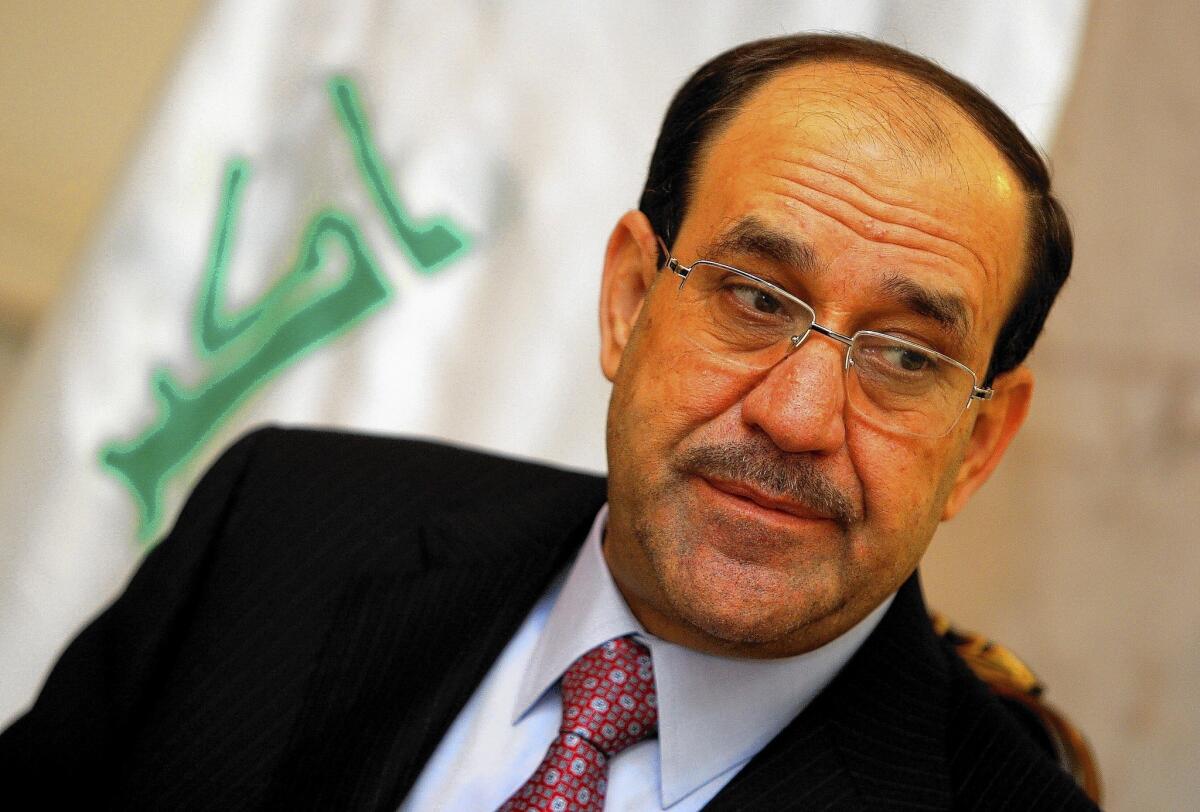Views of Maliki encapsulate Iraq’s stark sectarian split

- Share via
Reporting from Junaja, Iraq — This poor, sun-scorched village on the Euphrates is like so many in Iraq: The electricity is spotty, the sewer system a mess, the main road an obstacle course of potholes.
Oddly, many residents see these problems as a credit to Junaja’s most famous native, former Iraqi Prime Minister Nouri Maliki.
“He didn’t favor one place or one person over any other,” said Saif Jubouri, a 22-year-old clerk at a convenience store a stone’s throw from Maliki’s boyhood home.
“This is his birthplace so you might expect he would have turned it into a palace. But he treated everyone equally.”
The portrayal of Maliki in Western capitals and in much of Iraq — as a Shiite Muslim strongman who hoarded power and systematically marginalized minority Sunni Arabs and Kurds — could not be more different from his image in Junaja and across southern Iraq’s Shiite heartland.
For many here, Maliki’s abrupt resignation last week under mounting domestic and international pressure was a sop to Sunnis and Kurds and an unjust fate for a man who led Iraq out of a vicious civil war.
Even those who believe it was time for the two-term leader to step aside reject the suggestion that he ruled in a sectarian manner, arguing that Shiite-majority areas such as Junaja, about 50 miles south of Baghdad, suffer from the same lack of basic services as the rest of the country.
The disparate views underscore how sharply Iraq is divided as its political leaders attempt to form an inclusive new government that can unite the country against the determined Sunni-led militant group known as Islamic State, which has seized chunks of northern and western Iraq.
Beneath the loyalty to Maliki lies broad opposition among many Iraqi Shiites to calls for greater political power for Sunnis in particular. Maliki’s political bloc won a plurality of seats in April’s parliamentary elections before Islamic State’s onslaught caused top Shiite political leaders and clerics to turn against his bid for a third term, believing he had become too divisive to lead the fight against the extremists.
In Iraq’s multi-sectarian political system, developed after its post-Saddam Hussein constitution was adopted in 2005, the prime minister is a Shiite, the parliament speaker a Sunni and the president a Kurd.
Shiite, Sunni and Kurdish leaders all have endorsed the new prime ministerial nominee, veteran Shiite lawmaker Haider Abadi, a member of Maliki’s Dawa political party. But observers say that one of Abadi’s greatest challenges will be to forge consensus among sects that have grown deeply wary of one another.
“There is an absence of trust, an absence of dialogue, an absence of understanding,” said Hanaa Edwar, a prominent Iraqi human rights advocate. “If you don’t rebuild that, it’s very difficult otherwise to reform the political process.”
On the battlefield Tuesday, Iraqi forces attempted to push into the militant-held northern city of Tikrit but came under withering fire and retreated, Iraqi news agencies reported. The clashes signaled that Islamic State fighters — who were routed from a strategic northern dam a day earlier by U.S. airstrikes and Kurdish Iraqi ground troops — remain firmly in control of some majority Sunni Arab cities, including Tikrit, the hometown of the late dictator, Hussein.
The U.S. military said it continued to attack Islamic State militants, with fighter jets conducting two airstrikes near the Mosul dam in the 24 hours ending Tuesday afternoon.
One of the airstrikes destroyed an Islamic State checkpoint, the Pentagon said. The other was not successful.
Islamic State militants in cities such as Tikrit enjoy considerable support from Sunni residents opposed to what they view as Shiite domination in Baghdad. That has led some Iraqi Shiites to regard Sunnis as a potential fifth column, rekindling bitter memories of the sectarian civil war of the last decade, which pitted Al Qaeda-allied Sunni extremists against Shiite militias.
“The Sunnis helped open the door to Al Qaeda, and Al Qaeda brought ISIS,” said Fahim Jawad, an army trainer in Junaja, using an acronym for Islamic State.
Jawad, sitting cross-legged in his living room below a poster of the revered Shiite Imam Hussein, dismissed a list of Sunni grievances against Maliki. Because Sunnis hold the post of parliamentary speaker and ran several Cabinet ministries in Maliki’s government, he said, they cannot claim they were politically marginalized.
In late 2012, when protests erupted after the arrests of bodyguards for the Sunni finance minister, Maliki took steps to address one of the demonstrators’ demands — releasing some of the thousands of Sunni prisoners being held without charges — before changing tack and launching a violent crackdown.
In his hometown, there are few signs of the Maliki connection. His dour visage glares from only one billboard in the nearby town of Tuwairij, above the Dawa Party offices. His childhood home, a two-story brick block, sits abandoned and overgrown with weeds, a popular spot for children to play hide-and-seek.
His supporters drew a contrast with Saddam Hussein, whose picture was plastered everywhere when he ruled Iraq, and who famously poured money into his home village of Auja. Jawad said that those who complained about Maliki wanted to return Iraq to the days of minority Sunni rule.
“Maliki gave them seats in the government. They held demonstrations to call for their rights and he gave them their rights,” Jawad said. “What they want is power. They want things to go back to the way they were before.”
An hour’s drive to the north, in the predominantly Sunni Baghdad suburb of Dora, a burly 34-year-old mechanic described his relief at seeing Maliki out of office. His two brothers were each imprisoned for several years under Maliki on vaguely defined terrorism allegations, he said, before being released without charges.
Both have since fled to Turkey, said the mechanic, who gave his name only as Ahmed because he feared reprisal.
“The only people being arrested under the terrorism law are Sunnis,” he said. “We don’t have a national security force; we have a sectarian security force.”
That analysis is shared by many Western experts who had warned for years that Maliki’s authoritarian tendencies — his control of the security forces, weakening of the parliament and efforts to undermine political rivals — were putting Iraq back on the path to sectarian conflict. In May 2013, the Institute for the Study of War, a Washington think tank, wrote that Iraqi Sunnis “are functionally excluded from government.”
Tariq Sharifi, who runs a restaurant in Tuwairij called Layali al-Iraq, which Maliki is known to frequent, said he wasn’t surprised that the Obama administration waited until this month to begin airstrikes against Islamic State insurgents.
“Washington wanted Maliki to leave,” he said. “If America had intervened sooner, Maliki could have done more against ISIS and he would have kept his office.”
Times staff writers Patrick J. McDonnell in Irbil, Iraq, and W.J. Hennigan in Washington contributed to this report.
More to Read
Sign up for Essential California
The most important California stories and recommendations in your inbox every morning.
You may occasionally receive promotional content from the Los Angeles Times.













